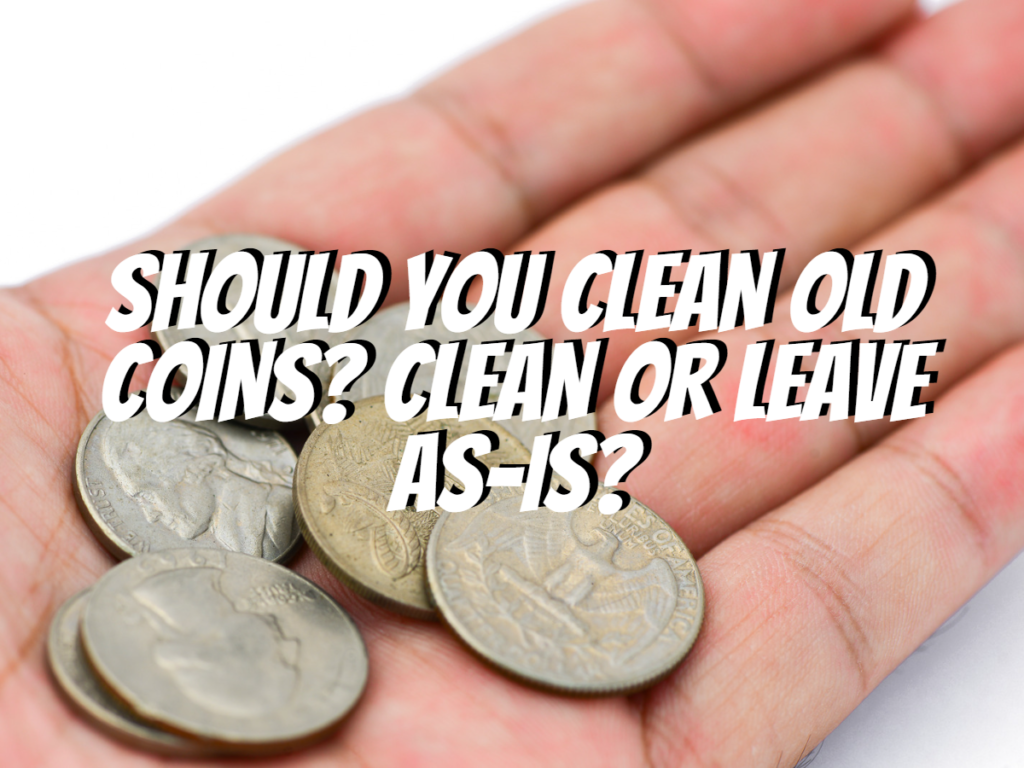So Should You Clean Old Coins? The short answer is NO! Why avoid cleaning old coins? As far as collectors are concerned, you might be surprised to know that cleaning a coin lowers its value. Of course, the exception would be if it were so dirty that it was barely recognizable or visible. But in general, don’t clean any old coin.
Old coins often have deposits that look like dirt but protect the coin from further deterioration. And even if you think you see dirt or tarnish on a coin and want to clean it off, you could be removing valuable “toning,” which adds beauty and often raises the coin’s value. On the other hand, cleaning too aggressively could also remove important details from your coins – like dates! Overall, there’s too much at stake here for most people (like me!) to risk ruining something of value because we wanted our collection to look nice and shiny…
Should You Clean Old Coins?

Don’t clean rare and old coins. These coins usually have more value when they’re left as-is. Coin collectors look for originality, so consider leaving these vintage coins alone. The American Numismatic Association and the Professional Coin Grading Service say you shouldn’t touch antique or rare coins with your fingers.
You can ruin their value with rare coins by touching them or cleaning them with a chemical solution or soap and water. Of course, this doesn’t mean you should leave all your old pennies covered in dirt—you can still clean most of them, especially if they’re not collector’s items worth a lot of money.
Coin Discoloration
To determine if a coin has been discolored, rub your coin’s surface with a soft cloth. If you notice, some of the tarnish comes off the fabric. Then it is most likely that your coin has been discolored. If you are still unsure and have some coins you do not care about damaging, try using various mild acids on each one to see if they react to these chemicals. You can test for silver acidity by taking a little nitric acid and putting it onto an inconspicuous spot on one side of the coin.
Drop the acid a drop or two, and then check out what happens. If nothing happens, it is probably safe to use this on the other coin. However, if you notice some reaction between your coins and these acids, don’t clean them! This could mean that they are coated with nickel or lead, which would mean they are fakes!
That Discoloration Is Part Of The Coin’s History

What you may see is not dirt but the coin’s original surface. Every time a coin is handled, it develops a patina from oils in people’s hands so that what you’re seeing could be part of a coin’s history: like its fingerprint.
Cleaning an old coin may make it look new, but it also makes it less valuable in the eyes of collectors and dealers. If you want to clean a coin, seek a professional who can preserve your coin’s collectibility.
Discoloration May Indicate A Coin Is Counterfeit
The best way to determine if a coin is fake or counterfeit is by examining its color because the pigments and metals used in most counterfeit coins are different than those found in authentic coins. To examine a coin’s color, hold it to the light and look for a dull, flat appearance. If you discover discoloration, take your coin to a professional.
Additionally, carefully examine your coin’s surface for oddities like scratches or dents. These characteristics are usually present on counterfeit coins since they are illegally produced without the benefit of modern machinery. If you notice any unusual flaws on your coin’s surface, have it examined by an expert immediately!
Cleaning Using Abrasives Can Damage And Ruin A Coin

Another cleaning technique to avoid is the use of abrasives. An abrasive is any substance that can grind away the surface of a material through rubbing. For example, you should avoid being abrasive when cleaning coins.
Abrasives you should never use include: scouring powders, steel wool, sandpaper, emery cloth, or even toothpaste with baking soda (sodium bicarbonate). These chemicals are considered corrosive and will permanently damage your coin’s surface. Other chemicals used on numismatic videos include GemOro Sparkle Spa Ultrasonic Jewelry Cleaner and various tumbler formulas listed as “ultrasonic cleaner solution.” These solutions are also considered corrosive and should not be used on coins.
Some possible abrasives you could use on coins include soap/detergent, rubbing alcohol; hydrogen peroxide; ammonia; vinegar (acetic acid); lemon juice (citric acid). However, just because they’re considered non-abrasive doesn’t mean they won’t damage your coin’s surface! These chemicals can still cause harm to collectible coins since their metal composition may be sensitive to certain types of chemicals that may tarnish, corrode or discolor them permanently.
Exceptions To The Rule Of Not Cleaning Older Coins
There may be some exceptions to the rule of not cleaning older coins. There are some situations where you may want to clean your old coins:
- Old Coins that Are in Good Condition but Look Dirty or Tarnished. Older coins that have turned brown or black with age can be cleaned if they are in good condition and not valuable. If a coin is worn, do not clean it! The damage caused by cleaning worn coins is almost always more significant than the benefit of having a bright, shiny coin.
- Coins That Have Been Cleaned Before, But Still Look Dirty. If someone else has already cleaned your coin, but it still looks dirty, you might consider giving it another bath in plain water, a mild solution like soap and water, or jewelry cleaner (diluted). However, if the coin shows any damage after its first cleaning, do not clean it again!
- Coins That Are Only Slightly Dirty. Even a slightly dirty coin should never be cleaned. Unless they are extremely common and worth only their bullion value (the value of their metal). Otherwise, you could irreparably harm the numismatic value of your coin. Most collectors prefer their coins uncleaned (and therefore original).
Takeaways:
The best option is to find a professional coin grader to do the cleaning for you. There are many reasons this is a better choice than cleaning the coins yourself, not the least of which is that it’s nearly impossible to clean old coins without damaging them irreparably.
In addition, if you don’t know what you’re doing, there’s a good chance that you can make your coins look worse instead of better! Lastly, it’s important to have a professional coin grader (such as those at PCGS) inspect your coins to ensure they are genuine and not counterfeit before being cleaned.
Before you go…
I hope this helped you decide whether or not to clean the old coins in your possession. Maybe I didn’t cover what you wanted to know, so I encourage you to leave a comment below, and I’ll try to get it to you as soon as possible. The bottom line is don’t clean old coins. Leave them as-is because they have more excellent value than clean coins.
Check out my next article: “Is There a Safe Way to Clean Old Coins?“
Related Articles:

